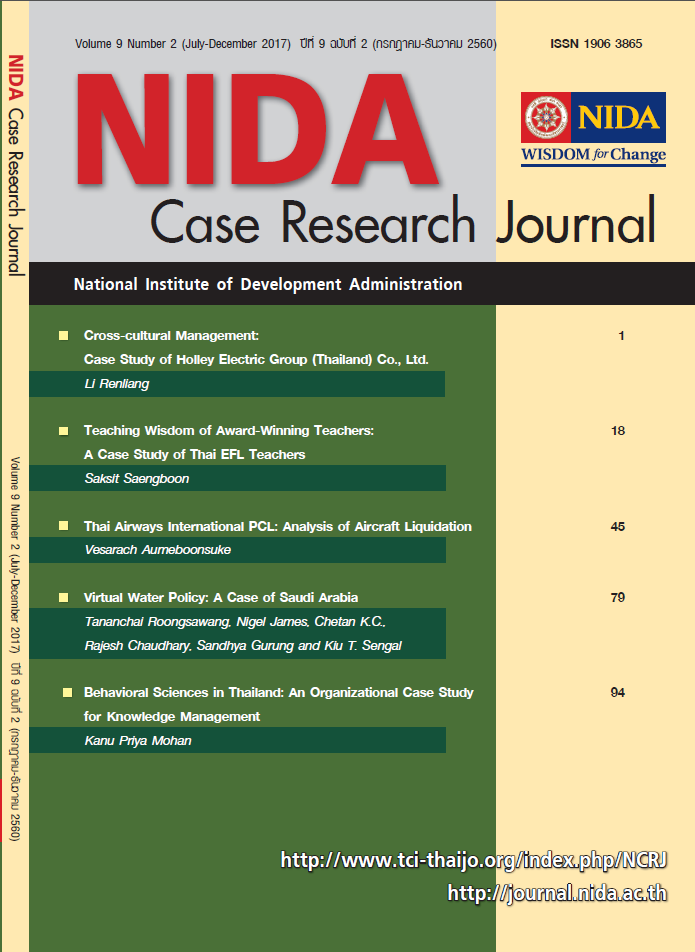Virtual Water Policy: A Case of Saudi Arabia
Keywords:
Virtual Water, Agricultural Policy, Underground Water, International Trade, น้ำจำแลง, นโยบายภาคเกษตรกรรม, น้ำบาดาล, การค้าระหว่างประเทศAbstract
Virtual water--an emerging concept in water resource management—refers to water used in and during the process of producing and consuming agricultural commodities. In recent years, the concept has become increasingly popular among countries facing water scarcity, such as the Middle Eastern countries. This case study is about how Saudi Arabia’s government has adopted and implemented the virtual water policy to optimize the country’s existing water resources by assisting the Saudi food manufacturing companies to buy agricultural lands and by promoting the cultivation of less water-intensive crops. With this case, students are expected to understand the water management system and past agricultural policy in Saudi Arabia. Based on this knowledge, students should be able to identify both visible and hidden stakeholders in the national policymaking process. Also, as the virtual water policy involves international trade and geopolitical issues, attention will be placed on the international regulatory aspect of transnational water management (or the lack thereof).
นโยบายน้ำจำแลง: กรณีศึกษาประเทศซาอุดิอาระเบีย
บทคัดย่อ
น้ำจำแลง หรือ น้ำเสมือนจริง (Virtual Water) เป็นแนวคิดว่าด้วยการบริหารจัดการทรัพยากรน้ำที่ใช้ในกระบวนการผลิตอาหารและสินค้าทางการเกษตร ในช่วงระยะเวลาหลายปีที่ผ่านมา แนวคิดน้ำจำแลงหรือน้ำเสมือนจริงนี้ได้รับความนิยมอย่างแพร่หลายในประเทศที่ขาดแคลนน้ำ เช่น ประเทศในแถบตะวันออกกลาง เป็นต้น กรณีศึกษาเป็นกรณีศึกษาเกี่ยวกับการนำแนวคิดน้ำจำแลงไปใช้ในการบริหารจัดการทรัพยากรน้ำโดยรัฐบาลซาอุดิอาระเบีย เช่น การสนับสนุนให้บริษัทอาหารข้ามชาติสัญชาติซาอุดิอาระเบียไปลงทุนซื้อที่ดินเพื่อการเกษตรกรรมในประเทศอื่น และการสนับสนุนการเพาะปลูกพืชที่ใช้ปริมาณน้ำน้อย เป็นต้น กรณีศึกษานี้มีวัตถุประสงค์เพื่อให้ผู้อ่านมีความรู้ความเข้าใจในสถานการณ์การบริหารจัดการน้ำและนโยบายด้านการเกษตรในประเทศซาอุดิอาระเบีย จากความรู้ความเข้าใจดังกล่าว ผู้เรียนถูกคาดหวังให้สามารถระบุ ผู้มีส่วนได้เสียที่ชัดเจนและผู้มีส่วนได้เสียแอบแฝงในกระบวนการกำหนดนโยบายที่เกี่ยวข้องกับการบริหารจัดการน้ำ นอกจากนี้ นโยบายน้ำจำแลงยังเกี่ยวโยงกับการค้าระหว่างประเทศและกรณีพิพาทด้านภูมิรัฐศาสตร์ ดังนั้น กรณีศึกษาจึงให้ความสำคัญกับระเบียบกฎเกณฑ์และสนธิสัญญาการค้าระหว่างประเทศตลอดจนการบริหารจัดการทรัพยากรน้ำข้ามพรมแดน





